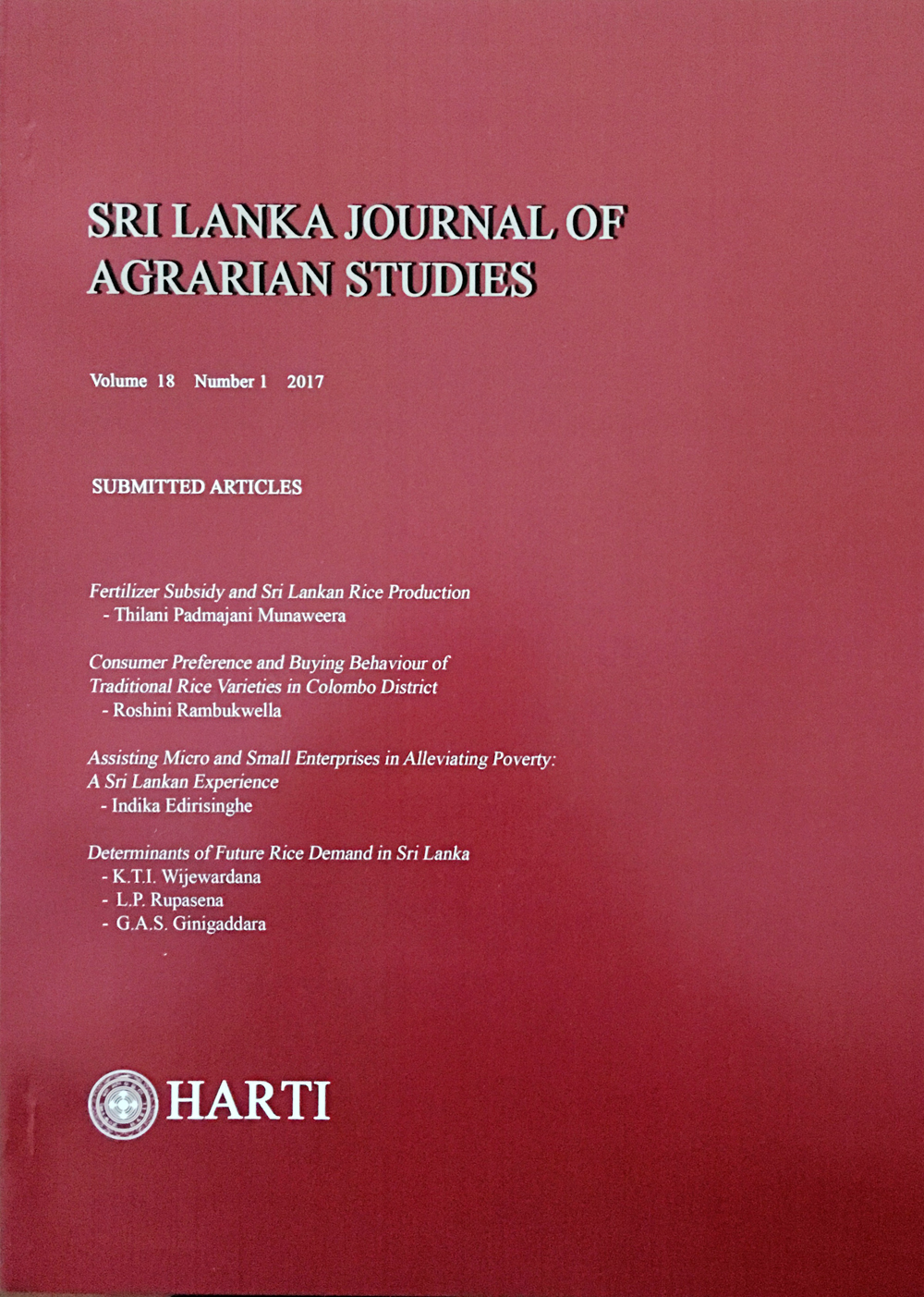Completed Research Projects 2009
- Evaluation of national food drive programme
- Study on impact of decrease of cultivated paddy lands in the wet zone of Sri Lanka
- Spatial and temporal variations of women’s role in agriculture
- Anicut system in Sri Lanka
- Changing terms of trade in small farming sector in Sri Lanka
- Study of Pul Eliya Village
- Economic evaluation of institutional level rainwater harvesting
- Action research project in Sudukanda-Nikawawa
- Impact of high food prices on Sri- Lankan households
- Marketing of vegetables through supermarkets: Procurement practices and its implication on farmers
- An Evaluation of provincial agricultural extension system
- System of Rice Intensification (SRI)
- Public-private partnership in irrigation management: Experiences of the Ridi Bendi ela farmer company model
Completed Research Projects 2010
- Market information project
- Impact of ICT based agricultural extension on farming sector
- Impact of mechanization in paddy sector on rural labour market
- Seed Production and Marketing in Sri Lanka
- Critical examination of share cropping in paddy farming
- Development of fruit crop sector
- Factors affecting the determination of marketed surplus and storage decisions by paddy farmers in major producing areas
- Agri-food supply chain management: issues and challenges
- Land degradation: A review of concepts and definitions
- Eco-friendly farming in Sri Lanka
- Land fragmentation in Settlement Schemes.
- Assessment on rural financial market
Completed Research Projects 2012
Completed Research Projects 2012
- Impact of donor assistance on agricultural based livelihoods in Northern province
- Rapid assessment survey on use of plastic crates in transportation of vegetable and fruits
- Consumption pattern and consumer preferences: A study of fresh and processed fruits in the Western province
- Value chain of highly perishable vegetables
- Food security assessment in Northern and Eastern province 2012
- Factors affecting for less youth participation in smallholder agriculture in Sri Lanka
- Evaluation of solar powered drip irrigation project phase - 02
- Alternative approaches for small tank/cascade rehabilitation: socio – economic and institutional perspective
- Evaluation of the soil conservation and watershed management program implemented by Hadabima Authority of Sri Lanka
- National seed policy and the OFC seed sector performances
- Changing impact tariffs of major food crops and trade production in paddy sector in Sri Lanka -1st Phase
- Impact of small scale irrigation rehabilitation and water management under dry zone livelihood support & partnership programme
- Impacts of promoting micro-finance and income generation activities under dry zone livelihood support and partnership programme(IFAD)
- Evaluation of divinaguma development programme(Ministry Fund)
- Evaluation of rice processing village(Ministry Fund)
- Vegetable collection centers in Badulla & Monaragala(IFAD)
- Production & utilization of organic fertilizer
- Contract farming in vegetable seed production an economic analysis
- Agricultural forward constructs as pre harvest commodity problems and prospects
- Investment impact of microenterprise component of this dry zone livelihood support and partnership(IFAD)
- Forward sales contracts (FSC) sector: Experience and lessons from failure in badulla and Kurunegala districts dry zone livelihood support and partnership programme(IFAD)
- The success of modified FFS approach as an extension tool in promoting rain fed upland farming dry zone experience and lessons learned(IFAD)
- Multiple effects and impact of small farmer (FFS BASED) seed potato production in Badulla District(IFAD)
- Impact of dairy development sub project – Badulla, Monaragala, kurunegala and Anuradhapura districts(IFAD)
- Study proposal on big onion & red onion value chains in Anuradhapura & Monaragala districts(IFAD)
- Dry zone livelihood support & partnership program. Impact of convergence of the project interventions(IFAD)
- Production of compost from municipal solid wastes (MSW)
- Assessment of pesticide usage in up-country vegetable forming
- Impact evaluation of Api wawamu Rata nagamu programme(Ministry Fund)
- Domestic / Export market for organic food present status constraints & future potential
- Assessment of indigenous Yams as a Subsidiary food Crops in Sri Lanka
- Evaluation of dedicated economic centers comparative analysis in Norochcholi and Nuwara Eliya
- Viability of controlled environmental agriculture for vegetable farmers in Sri Lanka
- Model village development – Buduruvagala
- Adoptability of use of technology/products developed by IPHT
- Study on effect of rural infrastructure development on diversification of farming systems and income of rural households in Southern province
- Factors affected for adoption recently introduced OFC & vegetable seed varieties of department of agriculture
- CIRDAP Rural development report in 2012
Completed Research Projects 2011
- Production and Marketing Constraints and Problems of Ginger and Turmeric.
- Farmers Response on TV Programme on Agriculture.
- Effects and Problems of Crop Diversification in the Food Crop Sector-Changing farming system in North western province.
- Performance Evaluation of Farmer Organaization.
- Performance Evaluation of Farmers Bank.
- Structure Conduct and Performance of Rice Milling Industry in Polonnaruwa and Hambantota districts.
- An Overall Assessment of the Agricultural Marketing Systems in Northern Province of Sri Lanka.
- Analysis of Marketing Margins of Potato and Red onion.
- Crop Production Performance in the Anicut Schemes in Walawe Basin.
- Adoption of Drip Irrigation systems: Current Status problems and Options.
- Reasons for Underutilization of Agricultural Lands in the Northern province.
- Pesticide Usage and the Current Regulatory Framework in Sri Lanka.
- Governance of State Land in the Context of Decentralization: A Case study in Hambanthota District.
- “Dayata Kirula” 2012 Konakubukwewa Village.
At a time when the attention of the scientific community was focused on technological advances in agriculture based primarily on the development of high yielding varieties, it came to be perceived that social, economic and institutional factors required equal attention if such technological advances were to serve farmers and consumers alike over the long term. The HARTI was established in order to generate a range of policy analysis that would cover those key determinants of human and resource development in the agrarian sector. The institute was established in 1972 as a statutory board in collaboration with the UNDP/FAO, which functions under the Ministry of Agriculture.
It has developed into the premier national Institute in the field of socio-economic research relating to the use of land and water in Sri Lanka and has also developed the requisite skills and infrastructure for providing relevant training to farmers, field workers and managers in both the state and non-state sectors. The name of the Institute was changed as Hector Kobbekaduwa Agrarian Research and Training Institute in February 1995.
Latest Publications
Socio-Economic Condition of Diary Industry in Mahaweli H Area
By Sagarika Hitihamu and S.Epasinghe HARTI Research Rep ...
VIABILITY OF CONTROLLED ENVIRONMENTAL AGRICULTURE FOR VEGETABLE FARMERS IN SRI LANKA
By Sharmini.K.Kumara,Renuka Weerakkody and Epasinghe S. & ...
AGRICULTURAL FORWARD CONTRACTS AS PRE-HARVEST COMMODITY MARKETING: PROBLEMS AND PROSPECTS
By Nalaka Wijesooriya and Jayamini Champika HARTI Resea ...
SOCIO ECONOMIC FACTORS AFFECTING THE PRODUCTIVITY OF GREEN GRAM
By Rasika Wijesinghe,I.P.P.M.Wijesinghe and A.M.S.Per ...































